Climate Change and the Inuit – IELTS Reading Answers
6 min read
Updated On
-
Copy link
Table of Contents

Limited-Time Offer : Access a FREE 10-Day IELTS Study Plan!
The Academic passage ‘Climate Change and the Inuit’ is a reading passage that appeared in an IELTS Test.
Ideally, you should not spend more than 20 minutes on a passage. Let’s see how easy this passage is for you and if you’re able to make it in 20 minutes. If not, try more IELTS reading practice tests from IELTSMaterial.com
Climate Change and the Inuit
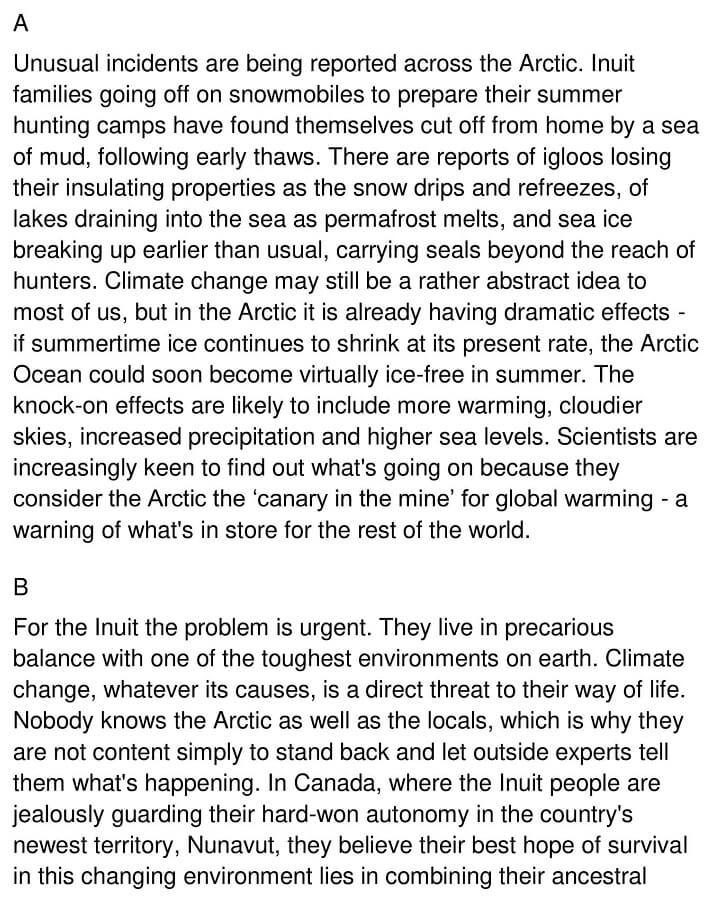
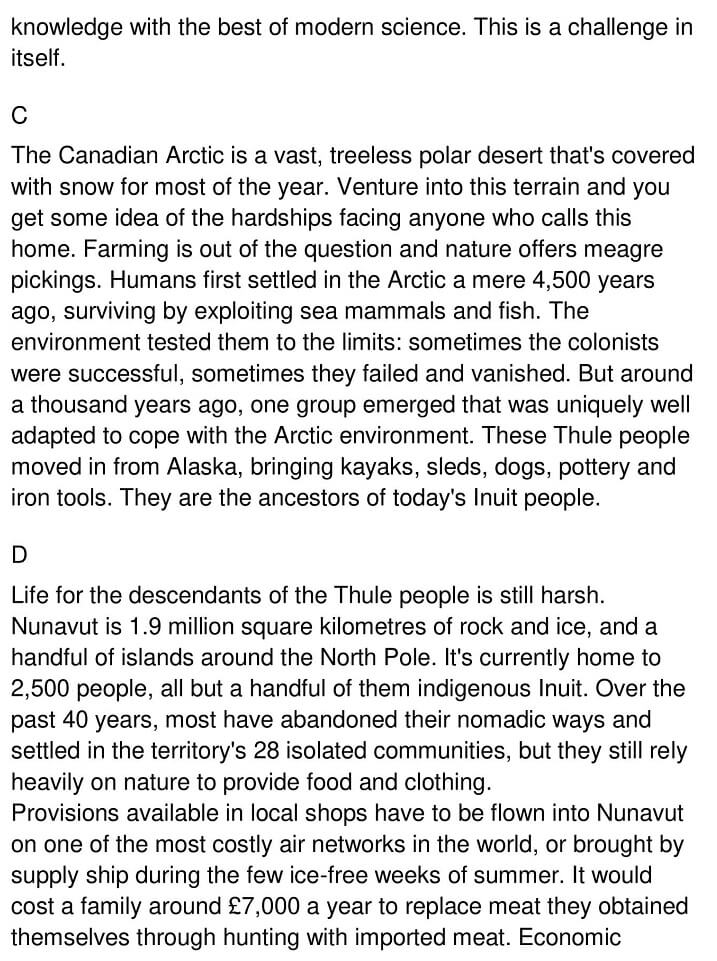
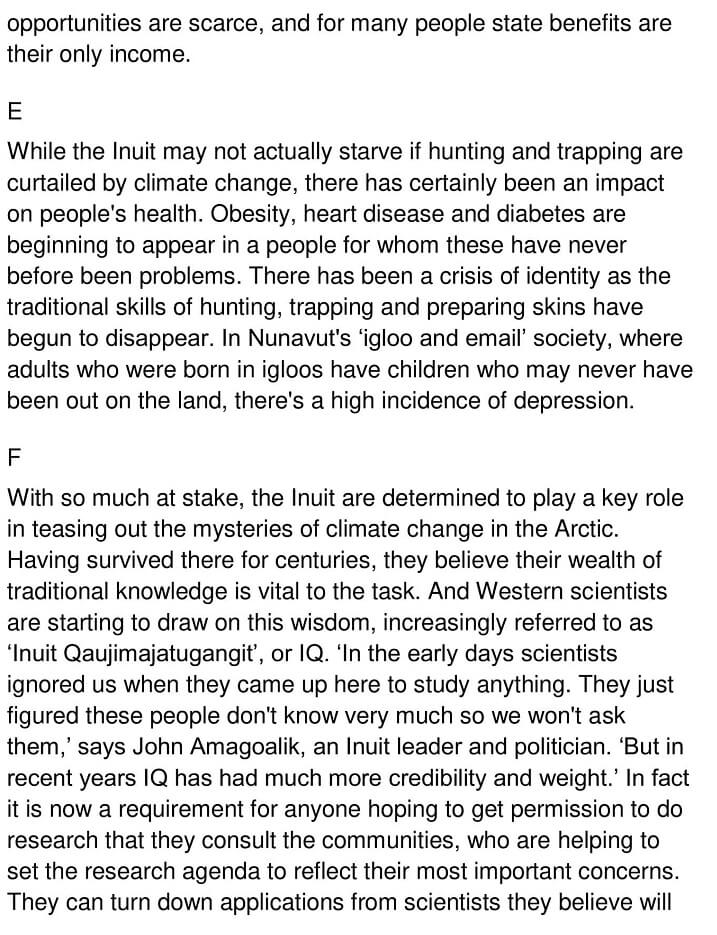
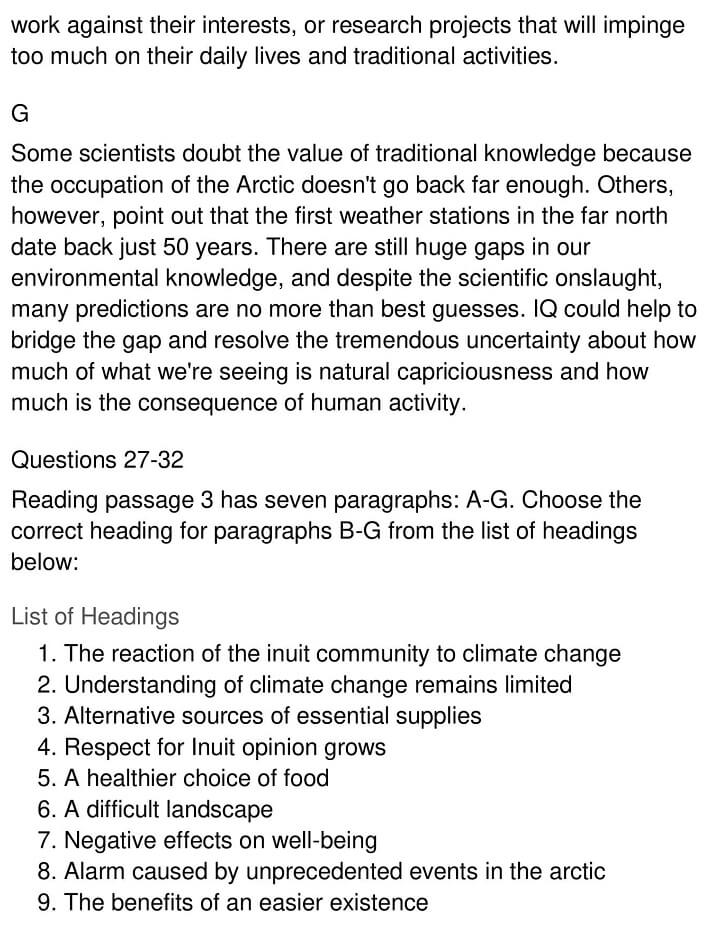
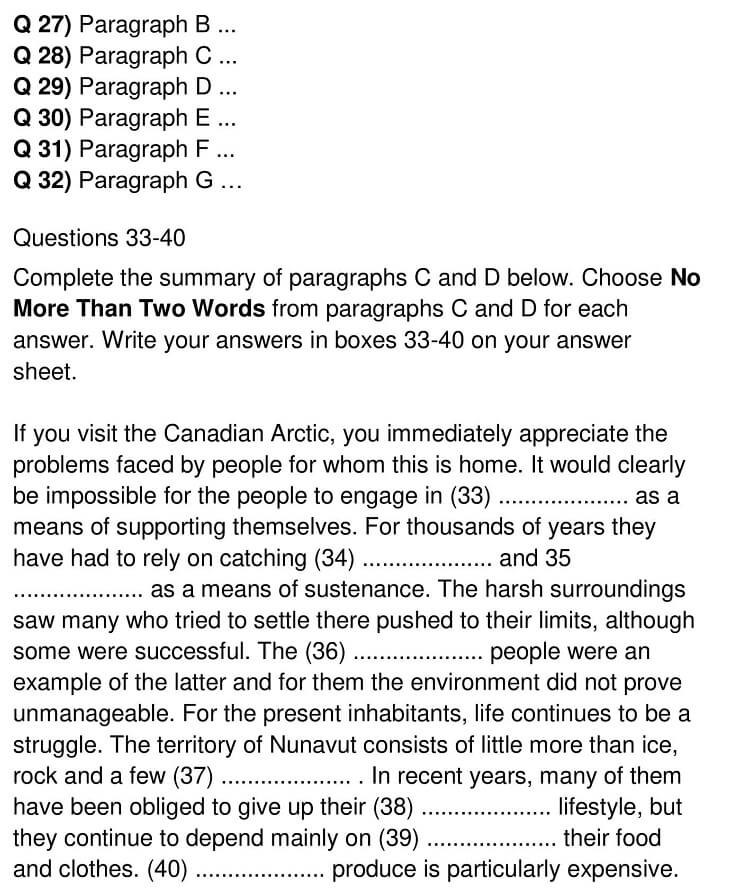
Answers
| Question Number | Answer | Explanation |
| 27 | 1. | In paragraph B, the keywords ‘climate change’ and ‘Inuit community’ can be found. In the fourth line of the paragraph, it is mentioned that they (the Inuit community) are not satisfied (‘content’) to let the outside expert tell that ‘climate change…is a direct threat to their way of life’. Moreover, these people are very protective (‘jealously guarding’) their hard-won autonomy in Nunavut, because they believe ‘their best hope for survival in this changing environment’ (‘climate change’) is to combine their ancestral knowledge and the best of modern science. As these three keywords – ‘climate change’, ‘Inuit community’ and ‘reaction’ (not ‘content’) are found in paragraph B, it is the answer. |
| 28 | 6. | Paragraph C begins with the description of the Canadian Arctic as a ‘treeless polar desert that’s covered with snow for most of the year’ (landscape) which is a very hard condition to live in. It is further added that in that terrain ‘farming is out of question’ and products from nature are ‘meagre’ (difficult). Moreover, it is mentioned that when the environment tested the limits of the colonists – humans who have settled in the Arctic- sometimes they ‘failed and vanished’. Therefore, paragraph C is the answer. |
| 29 | 3. | In paragraph D, it is mentioned that life of the Thule people is ‘still harsh’. Most of these people ‘have abandoned their nomadic ways’ but still rely on nature to provide ‘food and clothing’ (essential supplies). It is further added that ‘provisions available in local shops’ (sources) have to be flown on ‘one of the most costly air networks’ and it allows them to ‘replace meat’ (food) they obtained through hunting with ‘imported meat’(alternative). Hence, the answer is ‘Alternative sources of essential supplies’. |
Unlock Answers
| 30 | 7. | In paragraph E, the writer begins with the idea that climate change may not make the Inuits starve by preventing hunting and trapping, but will have an impact on ‘people’s health’ (well being). Some health issues like ‘obesity, heart disease and diabetes’ (negative effects) are becoming prevalent. Besides, ‘a crisis of identity’ due to disappearance of traditional skills of hunting and trapping, there is a ‘high incidence of depression’ (negative effect) among the adult Inuits as they cannot go out in the world. As the ‘negative effects on well being’ are discussed in this paragraph, it will be the answer. |
| 31 | 4. | Paragraph F begins with the idea that as the Inuits have lived in the Arctic for so long, they will play ‘a key role in teasing out the mysteries of climate change’. As a result, western scientists are ‘starting to draw on their wisdom’ that ‘traditional knowledge is vital’ (respect). John Amagoalik, an Inuit leader states that ‘in recent years IQ (or Inuit Quajimajatugangit) has had much more credibility and weight’ (Inuit opinion). In fact, now it is a ‘requirement for anyone hoping to get permission to do research that they consult the community’ (respect grows). As the keywords are explained in this paragraph, the answer will be ‘Respect for Inuit opinion grows’. |
| 32 | 2. | In paragraph G, it is stated that some of the scientists doubt the traditional knowledge as the life of people settled in the Arctic is relatively new (doesn’t go back far enough). Others point out that the first weather stations in the north ‘date back just 50 years’. Moreover, there are ‘huge gaps in our environmental knowledge’ (climate change) and ‘many predictions are no more than best guesses’ (limited). As the keywords are explained in this paragraph, the answer will be ‘Understanding of climate change remains limited’. |
| 33 | farming | In the first sentence of paragraph C, there is a description of the ‘terrain’ – ‘treeless polar desert’. In such an unproductive place ‘that’s covered with snow for most of the year’, ‘farming’ (means of supporting themselves for food) is ‘out of the question’ (impossible to engage). Hence, the answer is ‘farming’. |
| 34 | sea mammals | In the fourth sentence of paragraph C, the keywords ‘4,500 years’ (for thousands of years) and ‘surviving by exploiting’ (rely on catching) are present. The people, or, ‘they’ who have ‘first settled in the Arctic’ have survived by exploiting ‘sea mammals’ and fish which were their means of sustenance. Hence, the answer is ‘sea mammals’. |
| 35 | fish | In the fourth sentence of paragraph C, the keywords ‘4,500 years’ (for thousands of years) and ‘surviving by exploiting’ (rely on catching) are present. The people, or, ‘they’ who have ‘first settled in the Arctic’ have survived by exploiting ‘sea mammals’ and ‘fish’ which were their means of sustenance. Hence, the answer is ‘fish’. |
| 36 | Thule | In the fifth sentence of paragraph C, it is mentioned that some of the settlers in the Arctic were ‘successful’ (latter), while others ‘failed and vanished’. In the sixth sentence, the writer adds that around a thousand years ago, ‘one group’ emerged that was ‘uniquely well adapted to cope with the Arctic environment’ (environment did not prove unmanageable). In the last sentence, the name of the ‘one group’ is provided as ‘these Thule people’, who had moved in from Alaska, bringing kayaks, sleds, dogs, pottery and iron tools. Hence, the answer is ‘Thule’. |
| 37 | islands | The second sentence of paragraph D consists of the keywords ‘Nunavut’, ‘rock’, ‘ice’ and ‘islands’. The writer states that ‘Nunavut is 1.9 million square kilometers of rock and ice, and a handful of islands around the North Pole’. Hence, the missing blank will be filled by ‘islands’. |
| 38 | nomadic | In the third sentence of paragraph D, it is mentioned that ‘around 2,500 people’ (them) stayed in Nunavut. Over the ‘past 40 years’ (recent years), most of these people have ‘abandoned’ (obliged to give up) ‘their nomadic ways’ (lifestyle) and settled in 28 isolated communities of Nunavut. The answer is ‘nomadic’. |
| 39 | nature | In the fourth sentence of paragraph D, it is told that even though the 2,500 people (they), living in 28 isolated communities of Nunavut, have ‘abandoned their nomadic ways’, they ‘still rely’ (continue to depend) on ‘nature to provide food and clothing’. Hence, the answer is ‘nature’. |
| 40 | imported | The fifth and the sixth sentence of paragraph D has the keywords ‘costly’ and ‘provisions’. The writer mentions that ‘provisions’ (produce) available in local shops in Nunavut were flown on one of the most costly air networks in the world’ or supply ship. It costs a family ‘around $7000 per year’ to replace meat they obtained themselves through hunting with ‘imported meat’. Hence, the answer is ‘imported’. |
Check More IELTS Reading Answers
Also check :
Practice IELTS Reading based on question types

Start Preparing for IELTS: Get Your 10-Day Study Plan Today!
Recent Articles

Nehasri Ravishenbagam

Haniya Yashfeen

Haniya Yashfeen

Haniya Yashfeen
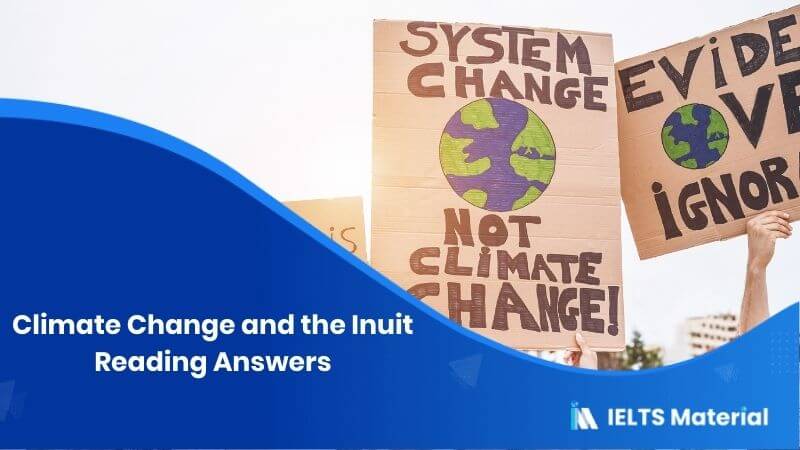



Post your Comments